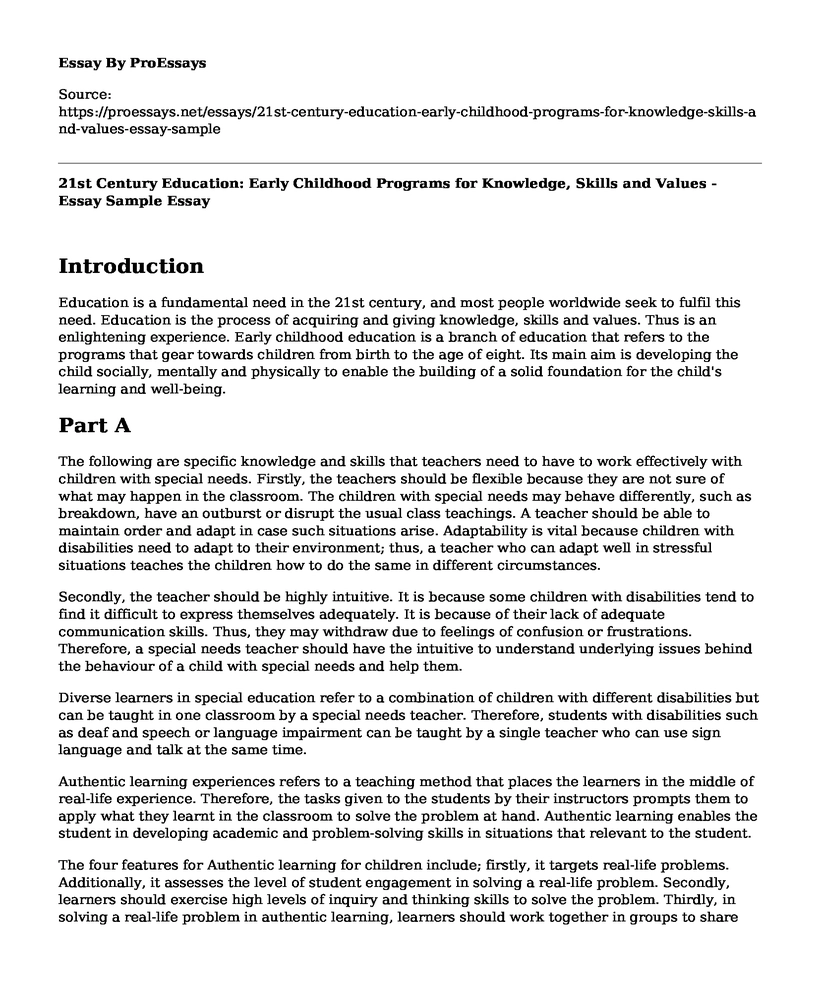Introduction
Education is a fundamental need in the 21st century, and most people worldwide seek to fulfil this need. Education is the process of acquiring and giving knowledge, skills and values. Thus is an enlightening experience. Early childhood education is a branch of education that refers to the programs that gear towards children from birth to the age of eight. Its main aim is developing the child socially, mentally and physically to enable the building of a solid foundation for the child's learning and well-being.
Part A
The following are specific knowledge and skills that teachers need to have to work effectively with children with special needs. Firstly, the teachers should be flexible because they are not sure of what may happen in the classroom. The children with special needs may behave differently, such as breakdown, have an outburst or disrupt the usual class teachings. A teacher should be able to maintain order and adapt in case such situations arise. Adaptability is vital because children with disabilities need to adapt to their environment; thus, a teacher who can adapt well in stressful situations teaches the children how to do the same in different circumstances.
Secondly, the teacher should be highly intuitive. It is because some children with disabilities tend to find it difficult to express themselves adequately. It is because of their lack of adequate communication skills. Thus, they may withdraw due to feelings of confusion or frustrations. Therefore, a special needs teacher should have the intuitive to understand underlying issues behind the behaviour of a child with special needs and help them.
Diverse learners in special education refer to a combination of children with different disabilities but can be taught in one classroom by a special needs teacher. Therefore, students with disabilities such as deaf and speech or language impairment can be taught by a single teacher who can use sign language and talk at the same time.
Authentic learning experiences refers to a teaching method that places the learners in the middle of real-life experience. Therefore, the tasks given to the students by their instructors prompts them to apply what they learnt in the classroom to solve the problem at hand. Authentic learning enables the student in developing academic and problem-solving skills in situations that relevant to the student.
The four features for Authentic learning for children include; firstly, it targets real-life problems. Additionally, it assesses the level of student engagement in solving a real-life problem. Secondly, learners should exercise high levels of inquiry and thinking skills to solve the problem. Thirdly, in solving a real-life problem in authentic learning, learners should work together in groups to share ideas on how to resolve the issue and lastly, the teaching should be student-directed. It means the students should make their interpretations without help from the teacher.
Part B
The characteristics of an effective early childhood teacher include; firstly patience. Children learn differently some learn fast, while others are slow learners. Thus, the teachers should not be frustrated and quick to anger regardless of the challenges but, be patent with the children. Secondly, the teacher should be passionate; this is by having a great desire to make a difference in the lives of young children. Even on hard days, a real passion makes the teacher have a positive attitude. Thirdly, the teacher should be creative and do fun art projects with the students, even with limited resources. Fourthly, the teacher should be flexible because unexpected events happen, and flexibility enables the teacher to handle situations well. Lastly, the teacher should be dedicated to the learners and their career because it dedicated instructors inspire their learners to gain more knowledge.
A classroom climate for young children experiences in the class setting or the characteristic that affects the morale of the classroom environment. Therefore, to create a positive classroom climate, the teacher should; address the needs of the student, be orderly, know the students and let the students know him or her.
Conclusion
In summary, early childhood education is essential to a developing child. It is because, through this, he or she learns how to live with others in a social setting. Therefore, parents and teachers play a vital role in the overall growth of a child.
Cite this page
21st Century Education: Early Childhood Programs for Knowledge, Skills and Values - Essay Sample . (2023, Jun 19). Retrieved from https://proessays.net/essays/21st-century-education-early-childhood-programs-for-knowledge-skills-and-values-essay-sample
If you are the original author of this essay and no longer wish to have it published on the ProEssays website, please click below to request its removal:
- Research Paper on Use of Technology in the Early Childhood Education
- Counselor for Children Undergoing Through Stress Related Issues Job Interview
- Essay Sample on Emergent Bilinguals Education Policy
- Online Learning: Discussion Participation Assessed - Essay Sample
- Violence in Video Games Effect on Children Essay Example
- Research Paper on Combining Academic Goals and Community Service for Learning
- Essay Example on Assessing Student Learning: Anecdo-Observational Approach







